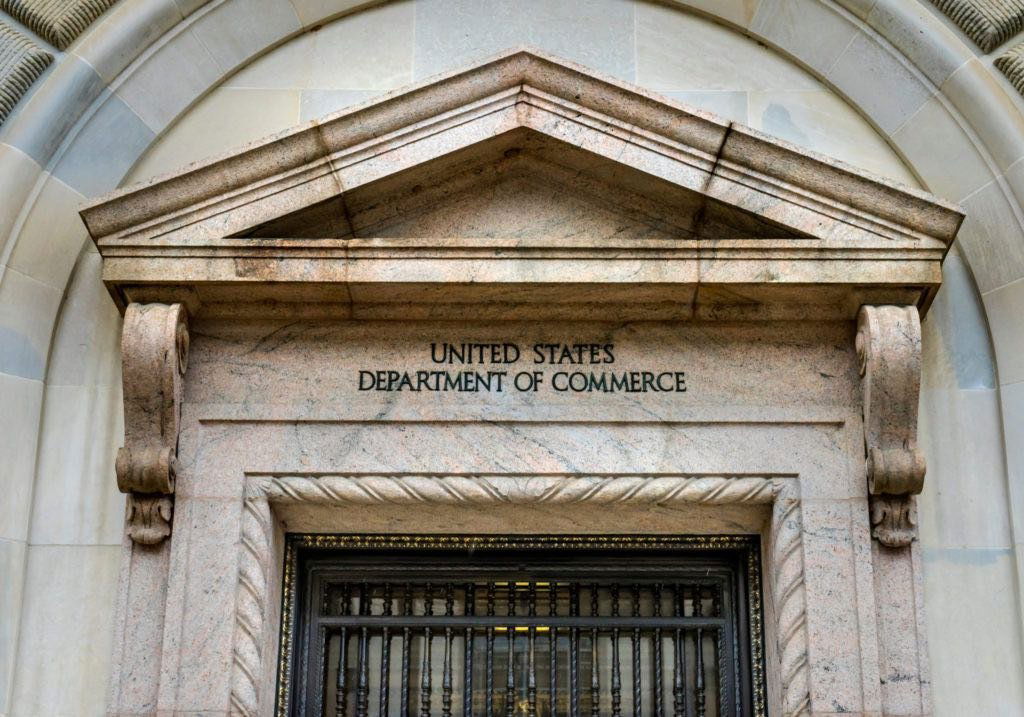
Remarks by Deputy Secretary of Commerce Don Graves at the Africa Growth and Opportunity Forum (AGOA) Private Sector Forum
Nov 2, 2023
Remarks by Deputy Secretary of Commerce Don Graves at the Africa Growth and Opportunity Forum (AGOA) Private Sector Forum
[email protected]
Thu, 11/02/2023 – 09:10
Export and investment promotion
Infrastructure
Intellectual property
AS DELIVERED
Thursday, November 2, 2023
Office of Public Affairs
Don Graves
I am thrilled to be here in Joburg to help open this year’s AGOA Private Sector Forum.
Let me start by thanking Florie Liser and the Corporate Council on Africa team as well as British Robinson and the Prosper Africa Secretariat for making this event possible.
I’d also like to thank Ambassador Brigety and the U.S. Mission in South Africa for their support for our robust U.S. delegation and U.S. Trade Representative Ambassador Tai for her leadership on AGOA and other vital U.S.-Africa trade priorities. Minister Patel, we thank you and your team at the Department of Trade, Industry, and Competition for being such wonderful hosts of this week’s events.
Many of you may have seen the New York Times series published last week, titled, “The World is Becoming More African.” This is very timely. For me, the core message is that a new generation of Africans are making their imprint on the global economy, culture, and politics.
All of us, the world over, stand to benefit from their dynamism, ingenuity, innovation, and their insistence to shape their world—our world–for the better.
Americans and Africans both seek greater economic opportunity and prosperity for our peoples. And we know that we can achieve that by expanding trade, investment, and commercial ties between our businesses, big and small.
But expanding economic opportunity does more than paving the way to material prosperity. It enables us to:
build vibrant connections between our communities,
unleash the creativity of our peoples, especially our youth;
uplift our shared values and culture; and
ultimately, enrich our lives as Americans and Africans.
And we know this to be true. For our own unique shared history. Look at the invaluable contributions that the U.S. African Diaspora – 46 million Americans who trace their roots to this continent – have made and continue to make, generation after generation.
Indeed, the Biden-Harris Administration recognized this early when the President shared his vision for the U.S.-Africa Partnership last year. He has often described the U.S.-Africa partnership as indispensable to meeting the most pressing global challenges such as the climate crisis, food insecurity, and democratic backsliding. But not only that. The partnership is also critical to seizing once-in-generation opportunities that will drive Africa’s transformation in clean tech, health security, digitization, climate-smart agriculture, and creative industries, to name a few.
As we in the Commerce Department help realize President Biden’s vision, we understand that—more than in any previous period—commercial ties between American and African entrepreneurs—including women, next gen, and Diaspora entrepreneurs—are driving this partnership and these ties promote supply chain resilience, job creation, and growth on both sides of the Atlantic for years to come.
I believe that the U.S.-Africa commercial relationship is at a tipping point with the potential to meaningfully help drive Africa’s sustainable growth and also shape a more inclusive global economy for years to come.
In my conversations with African government and business leaders, they repeatedly tell me that they view U.S. businesses as partners of choice. U.S. businesses offer superior technology, quality of equipment and services, a track record of developing local talent and promoting innovation, and the ability to leverage transparent and innovative commercial financing. Diaspora companies, in particular, bring an awareness of African markets and local environments that gives the U.S. a competitive edge.
For their part, U.S. companies are seeing new opportunities on the continent, as several African countries take bold steps to expand trade and investment. These include continent-wide efforts to establish the African Continental Free Trade Area, the world’s largest free trade area; and country efforts to accelerate digital transformation, develop clean energy supply chains (including critical minerals), and promote health security.
Indeed, promoting economic growth and development is what the African Growth and Opportunity Act has always been about, ever since its passage in 2000. It’s important to reflect on the significant achievements of AGOA as well as lessons learned, and to think creatively – all of us – on what AGOA can be in the future, given its upcoming expiration in 2025.
Even as we work towards reauthorizing AGOA, an important complement is what we at the Commerce Department are doing to promote two-way commercial, trade, and investment relationships with African countries.
Coming out of a successful 2022 U.S. Africa Business Forum, and after hearing from the U.S. business community and our African partners, I launched a first of its kind Commerce-wide Africa strategy. Our Africa strategy leverages the full range of the Department’s capabilities to:
help foster the commercial enabling environment including the investment climate, intellectual property rights, and standards.
promote two-way trade and investment, and high quality B2B deals in sectors that will have a outsized impact on Africa economies for years to come including infrastructure; digital, clean, and climate technologies; space commerce, critical minerals, and creative industries
promote innovation and upskilling including through small and medium sized enterprises on both sides of the Atlantic with strong contributions from the Diaspora so essentially to sustaining inclusive economic growth.
Expanding our commercial diplomacy to help position U.S. business as partners of choice for African entrepreneurs and governments
Our commitment to supporting these goals in Africa is at the heart of the Department of Commerce’s work and served as a core tenet of President Biden’s U.S.-Africa Leaders’ Summit and Business Forum held last December in Washington, D.C. And with $15.7 billion in investments and partnerships announced at that momentous event, our efforts have only expanded.
Let me give you a window into what we’re doing:
Our Commercial Law Development Program is working with the African Continental Free Trade Area Secretariat to provide investment advisory support and help advance the Women and Youth Protocol.
Later this year, our National Telecommunications and Information Administration will convene an African Youth Summit in Washington, D.C., to spotlight how technology improves lives and livelihoods, with a focus on digital upskilling, bridging the gender digital divide, and fostering entrepreneurship. We plan to convene a follow-up summit in Africa in early 2024.
Our National Oceanic and Atmospheric Administration is working closely with our African partners to counter illegal, unreported, and unregulated fishing activities, and, under the PREPARE program, are developing early-warning systems with a number of African countries for weather-related emergency preparedness.
A part of NOAA, our Office of Space Commerce recently helped organize the first U.S.-Africa Commercial Space Stakeholders Meeting in Azerbaijan, as part of the International Astronautical Congress, to highlight emerging space market opportunities between the United States and African nations.
The U.S. Patent and Trademark Office is working with African partners to promote creativity and innovation, including modernizing intellectual property legislation to bring it in line with international treaties and conducting training on the protection and enforcement of intellectual property rights. We also recently hosted a program on the digital distribution of creative content to further the development of the creative economy in Africa.
Our International Trade Administration is the center of gravity of commercial engagements in Africa:
With the help of our Foreign Commercial Service, we have launched new bilateral commercial dialogues with partner governments – most recently with Tanzania and Zambia – and we‘re renewing and re-energizing several existing engagements with other countries.
We’re collaborating with the State Department to develop a technical assistance program to support African governments in developing bankable infrastructure projects.
Working with our Minority Business Development Agency and through our Global Diversity Export Initiative, I am proud to announce here, the launch of a trade promotion program to connect U.S. companies, especially Diaspora-owned, women-owned U.S. business, in the personal care and cosmetics sector with exciting opportunities and new partners here in South Africa.
We’re promoting cleantech and cleantech supply chains through the U.S.-Africa Clean Tech Energy Network, introducing U.S. cleantech energy firms into a two-way ecosystem to unleash innovation and bankable deals.
We’re working on implementing a wide range of recommendations from the President’s Advisory Council on Doing Business in Africa, which helps us understand what American companies see as priorities for us to pursue in strengthening commercial ties in Africa. Some of the Council members are here with me this week gathering information to better help them make their recommendations, and I thank them for their service.
We’re co-chairing the President’s Digital Transformation with Africa initiative, to coordinate a whole-of-government effort to support African partners to grow vibrant, secure, and inclusive digital economies through building new infrastructure, developing human capital, and fostering productive regulatory environments.
And finally, we’re expanding our Commercial Service footprint with two new Foreign Commercial Service offices in our embassies in Côte d’Ivoire and Zambia, along with the 11 we have stationed in other African countries, serving as specialized resources to help position and advocate for U.S. companies with our host African governments and local businesses.
And finally, Commerce is a key player with our colleagues across the U.S. government on a number of initiatives designed to grow our toolbox.
These include:
The Partnership for Global Infrastructure – which is mobilizing billions of dollars in infrastructure financing with private sector partners, including for transformative economic corridors, in an approach that manages risk while ensuring high returns. Our support for greenfield rail line expansion as part of the Lobito Corridor connecting Angola, Zambia, and the DRC is an excellent recent case of PGI in practice.
The Prosper Africa initiative continues to refine how we are able to leverage the many trade and investment resources across the federal government in a more coordinated, streamlined way.
Meanwhile, Power Africa continues to increase energy access across sub-Saharan Africa, having supported 14,000 megawatts in new generation capacity and connected 36 million new African homes and businesses to electricity over the past decade.
At the root of all this work, again, is the simple notion that American and African businesses—with their spirit of entrepreneurship, willingness to take risks, and their ability to innovate—will shape what I believe is a quintessential 21st century partnership, the type of U.S.-Africa partnership that would I know would make my ancestors proud.
I have no doubt that this is the spirit that will motivate you in the various discussions you’ll have today. I hope all of you in the audience will contribute to those discussions and take the information you learn and the connections you make into all that you do moving forward.
Bureaus and Offices
International Trade Administration
Leadership
Don Graves
Tags
Doing Business in Africa
Read the full report from the U.S. Department of Commerce: Read More



